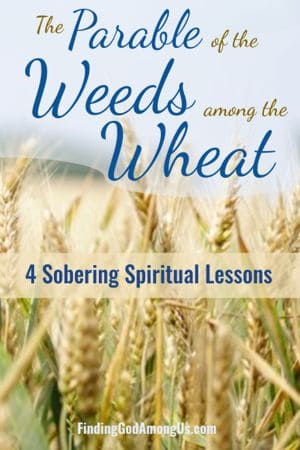In the Parable of the Weeds Among the Wheat, a man planted good seed in his field, but his enemy threw weeds on top. The wheat grew alongside the weeds. The man didn’t want to lose any wheat by pulling the weeds. They would be separated at the harvest.

Parable of the Weeds Meaning
God (the farmer) creates good people (wheat) but the devil (the farmer’s enemy) tempts them and some turn away from God (weeds).
The people who choose a life of evil (weeds) continue to live alongside God’s faithful people (wheat) and there is no separation made between the two groups until our final judgment.
Once the final harvest is made (judgment in God’s Kingdom), evil can no longer hide in the spiritual world. It is only then that a clean separation can be made between the wheat and the weeds (God’s people and the enemy’s people).
The Parable of the Weeds Spiritual Lessons
1. The devil is very tempting and convincing
Everything God creates is good, but humans are imperfect and the devil preys on our flaws. He tempts us into sin by planting seeds of jealousy, greed, selfishness, anger, unforgiveness, and every evil vice.
When we let him into our minds and hearts, he quickly displaces God. We can turn away from God before we realize it’s happening. Drawing near to God helps us stay firmly rooted in His love, especially when the devil pours out his tempting lies.
Recognizing the presence of anyone and anything that starts to pull us away from God is the first step to saying ‘NO’ to evil and preventing us from becoming weeds. When we’re with God, we shut the door in evil’s face. When we’re with God, we strive to please Him and not just please ourselves.
2. We must intentionally nurture a relationship with God
In Matthew 12:30, God said whoever is not for Him is against Him. It can only be one way or the other. If we’re not actively seeking a relationship with God, we’re drifting away. If we’re not in a relationship with God, we’re in a relationship with the devil.
We must be intentional in our relationship with God by nurturing it as we would grow a seed into a large plant. We must give it the time, attention, and nourishment it needs to grow.
Growing close to God doesn’t happen by accident. It’s intentional. It happens when we make Him a top priority in our lives. It flourishes when we seek to live according to His will and not to our own desires.
When we say ‘No’ to human vices, we automatically draw closer to God.
3. Everything from God is good
We can be sure that no evil comes from God, yet evil (weeds) exists in every part of society, even in churches.
As humans, we can’t adequately see or discern evil. Firstly, we all contain some measure of it, in our humanness. Secondly, evil exists in the heart, so it’s not always detectable by other humans.
Sometimes an evil person’s actions reveal their true heart, but sometimes evil is hidden well under pretty clothing and proper language and in powerful positions.
However, in the afterlife, there is no hiding evil. Our thoughts and hearts are clearly visible to God and He will separate the good from evil there. While on earth, we can fulfill God’s will by gently instructing those who are clearly separated from God to bring as many to salvation as possible.
4. Our inner being will be revealed at the time of judgment
At the time of our eternal judgment, our inner being will become known to all and the goodness of believers will shine forth as bright light.
May we use our time on Earth to pursue God’s will and keep the door to evil locked.
This post may contain affiliate links. This is my full disclosure.

Are you seeking deeper faith, a more meaningful life, or greater inner peace?
Embark on a journey of spiritual growth and self-reflection through the timeless teachings found within the forty parables of Jesus Christ. Grab your ebook, softcover, or LARGE PRINT. Read FREE with Kindle Unlimited! Learn more on Amazon (affiliate link). Read a Sample!
More Parables!
Do you love the parables as much as I do? You may enjoy reading life lessons on these others (listed below), these activities for adults and children, or this list of Parables and Meanings. More parable lessons are underway. See them all HERE!
Do you love journaling? Does writing down your personal reflections help you process your thoughts more fully? Perhaps these Christian writing journals will be helpful as you reflect on the life lessons of the parables.
- 6 Lessons from Mustard Seed Faith
- 4 Parable of the Hidden Treasure Lessons
- 5 Life Lessons from the Parable of the Talents
- 3 Parable of the Lost Sheep Lessons
- The Parable of the Sower explained – which soil are you like?
- 4 Life Lessons from The Parable of the Ten Virgins
- 3 Life Lessons from the Parable of the Rich Fool
- 3 Lessons from the Parable of the Vineyard Workers
- Parable of the Lost Coin Spiritual Lessons
- The Parable of Two Sons – 3 Spiritual Life Lessons
- The Parable of the Weeds – 4 Spiritual Lessons
- The Parable of the Persistent Widow
- Lessons from the Parable of the Pharisee and Tax Collector
- The Parable of the Pearl Life Lessons
- The Parable of the Great Banquet Lessons
- Parable of the Shrewd Manager Life Lessons
- Parable of the Yeast Life Lessons for Today
- Parable of the Unforgiving Servant Life Lessons
- Parable of the Wedding Feast Life Lessons
- Parable of the Net Life Lessons
- The Parable of the Growing Seed
- The Parable of the Tenants Life Lessons
- Parable of the Fig Tree Life Lessons
- Lazarus and the Rich Man Parable Life Lessons
- Parable of the Good Shepherd Bible Lessons
- Parable of the Wineskins Spiritual Lessons
- Parable of the Wise and Foolish Builders Lessons
- Parable of the Faithful Servant Life Lessons
- Parable of the Lamp Life Lessons
- Parable of the Two Debtors Life Lessons
- Parable of the Householder Life Lessons
- Parable of the Friend at Midnight Life Lessons
- Parable of the Master and Servant Life Lessons
- Parable of the Watchful Servants Life Lessons
- Take the Lowest Seat Parable Life Lessons
- The Parable of the Prodigal Son Life Lessons
- 5 Parable of the Good Samaritan Lessons
- The Cost of Being a Disciple Life Lessons
Be the First to Know!
Do you love Christian inspiration and seeking Jesus? What about devotionals and Christian books? Come join my email community!
Photo from Pexels.com by Pixabay